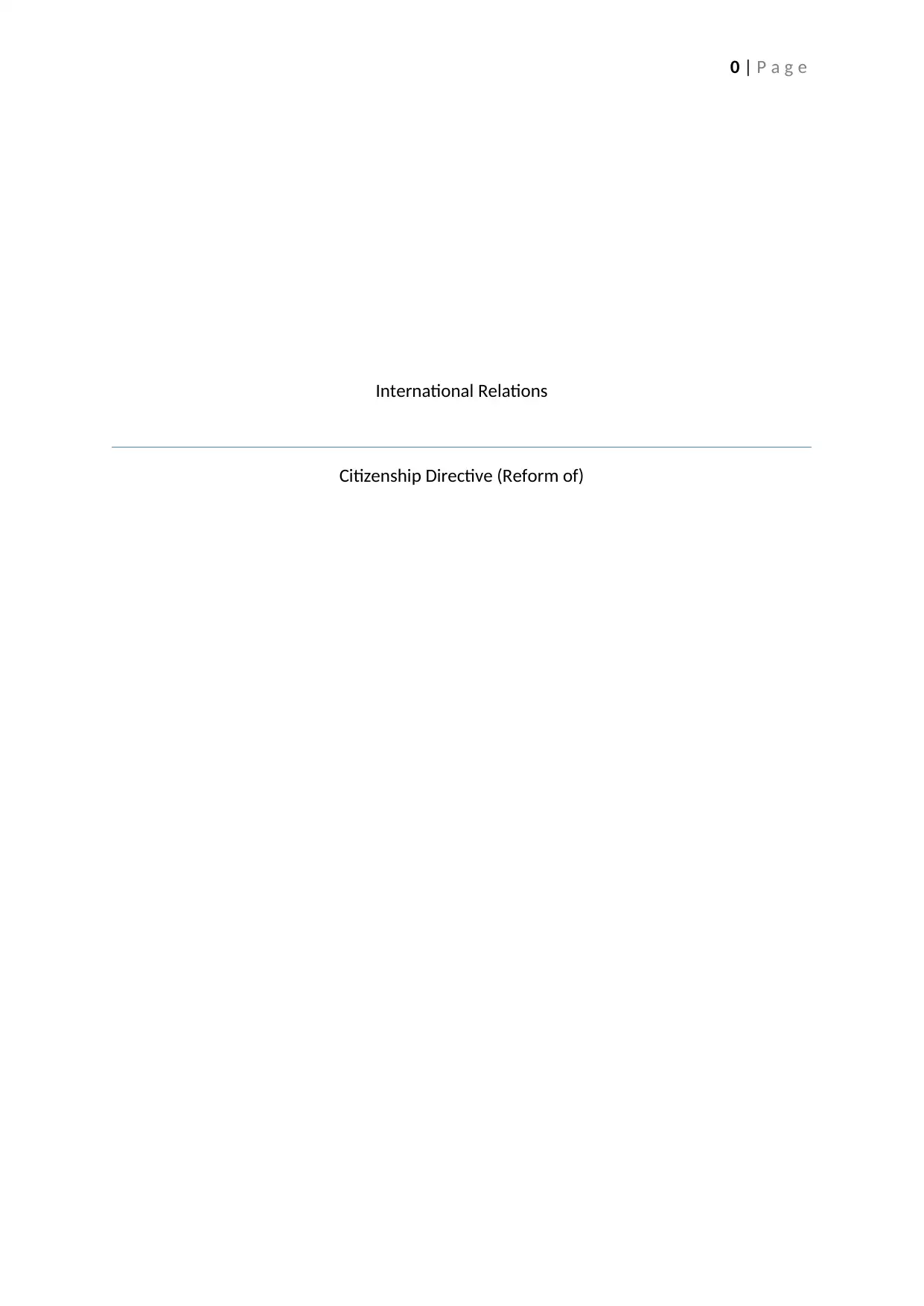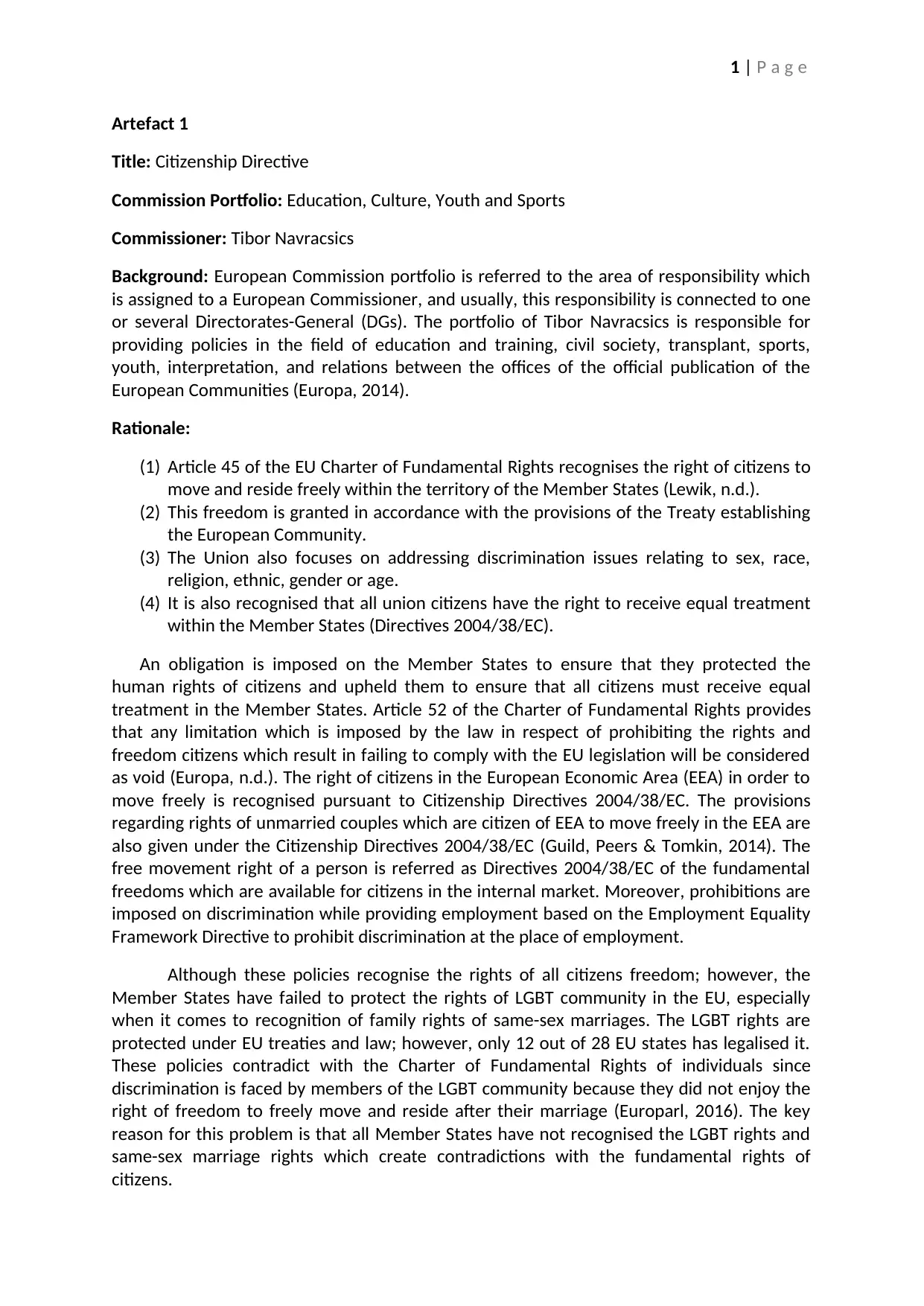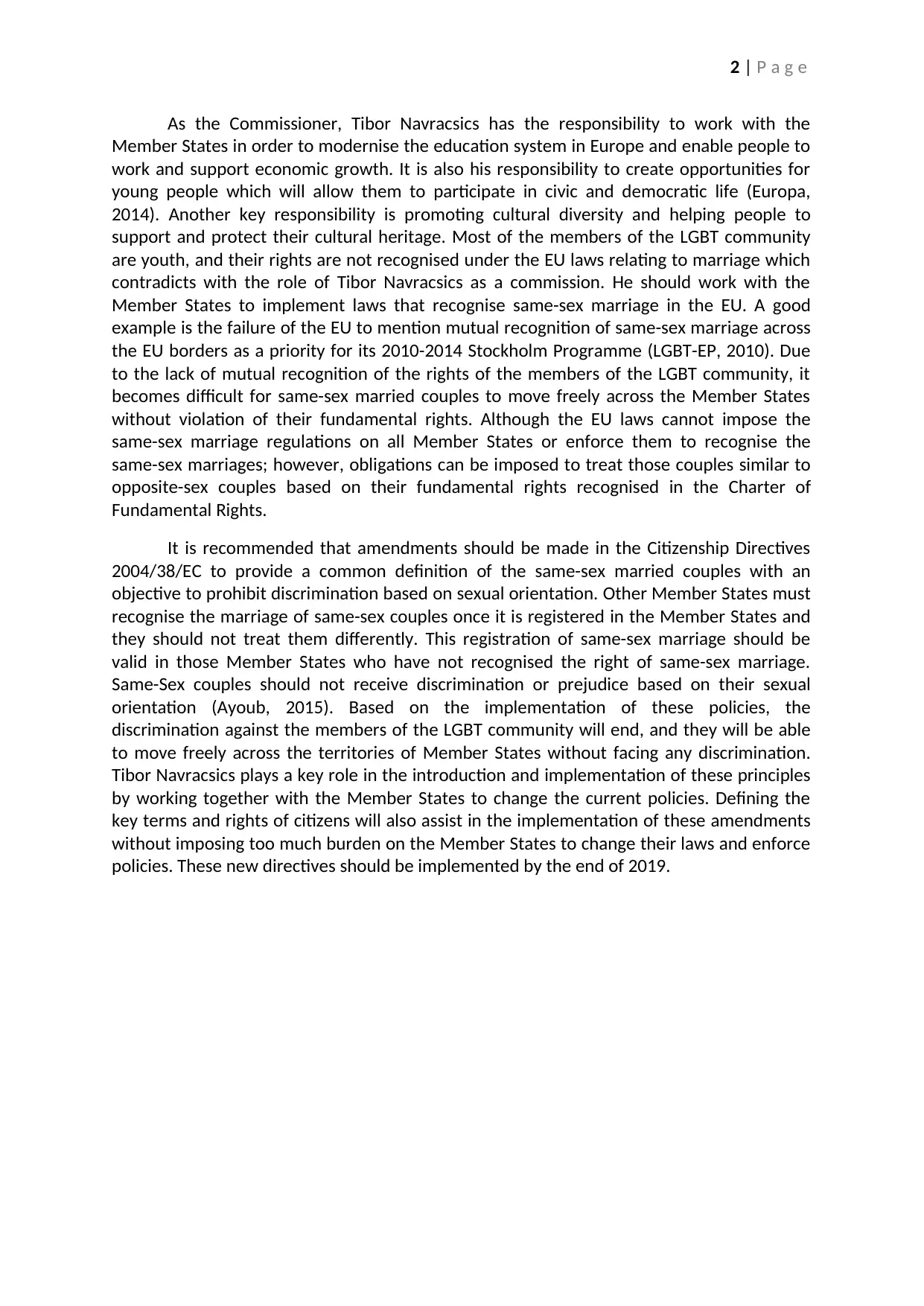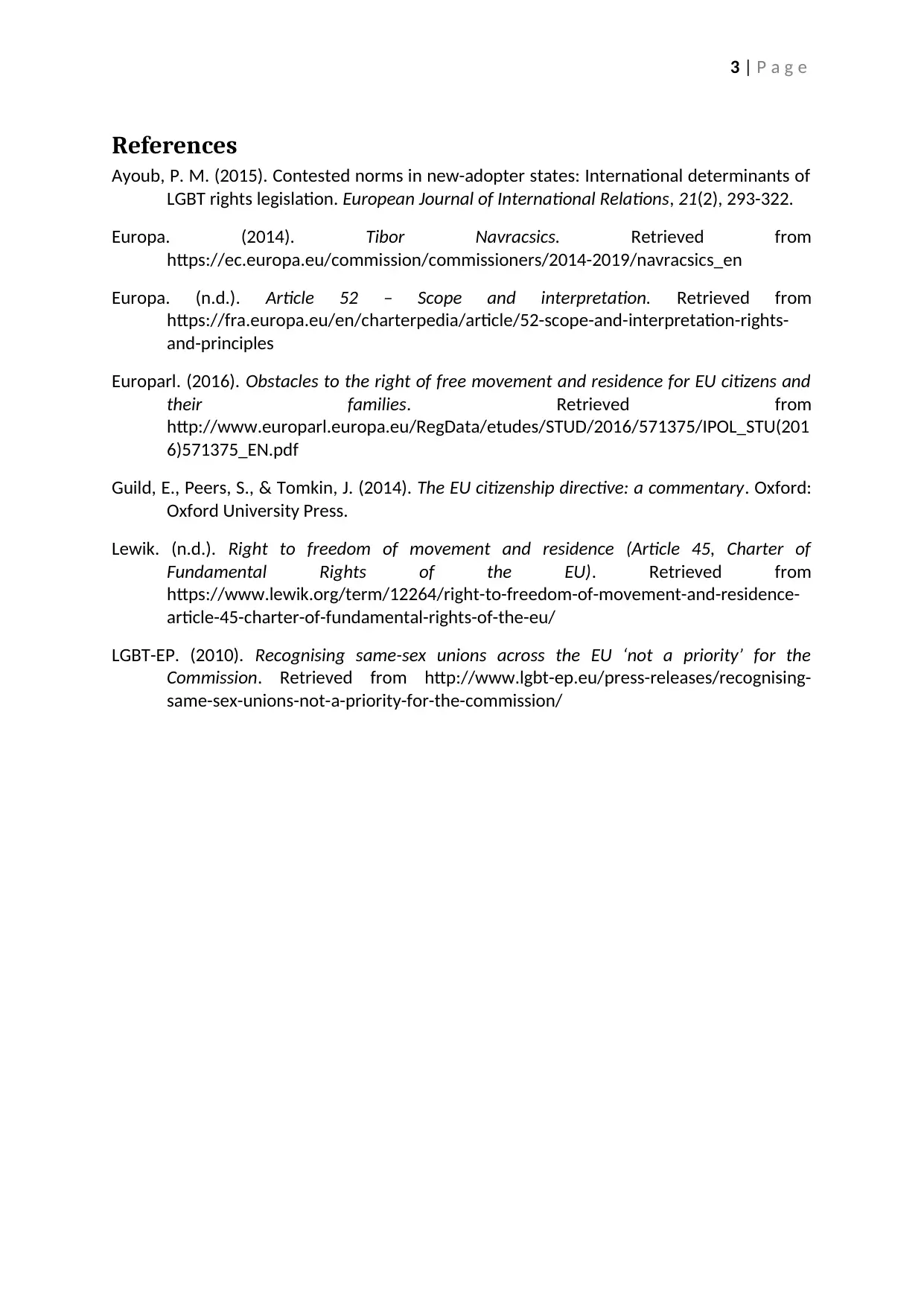Analysis: Reforming Citizenship Directive for LGBT Rights in the EU
VerifiedAdded on 2023/04/26
|4
|1220
|314
Report
AI Summary
This report examines the EU Citizenship Directive 2004/38/EC and its implications for the LGBT community, particularly concerning the recognition of same-sex marriage and freedom of movement within the European Union. It highlights the contradiction between the EU's commitment to non-discrimination and the varying levels of LGBT rights recognition across Member States, leading to challenges for same-sex married couples moving freely within the EU. The report suggests amending the Citizenship Directive to include a common definition of same-sex marriage and ensure that Member States recognize marriages registered in other states, thereby prohibiting discrimination based on sexual orientation. It emphasizes the role of the Commissioner for Education, Culture, Youth and Sports, Tibor Navracsics, in working with Member States to implement these changes by the end of 2019, aligning EU policies with the Charter of Fundamental Rights and promoting equality for all citizens.

0 | P a g e
International Relations
Citizenship Directive (Reform of)
International Relations
Citizenship Directive (Reform of)
Paraphrase This Document
Need a fresh take? Get an instant paraphrase of this document with our AI Paraphraser

1 | P a g e
Artefact 1
Title: Citizenship Directive
Commission Portfolio: Education, Culture, Youth and Sports
Commissioner: Tibor Navracsics
Background: European Commission portfolio is referred to the area of responsibility which
is assigned to a European Commissioner, and usually, this responsibility is connected to one
or several Directorates-General (DGs). The portfolio of Tibor Navracsics is responsible for
providing policies in the field of education and training, civil society, transplant, sports,
youth, interpretation, and relations between the offices of the official publication of the
European Communities (Europa, 2014).
Rationale:
(1) Article 45 of the EU Charter of Fundamental Rights recognises the right of citizens to
move and reside freely within the territory of the Member States (Lewik, n.d.).
(2) This freedom is granted in accordance with the provisions of the Treaty establishing
the European Community.
(3) The Union also focuses on addressing discrimination issues relating to sex, race,
religion, ethnic, gender or age.
(4) It is also recognised that all union citizens have the right to receive equal treatment
within the Member States (Directives 2004/38/EC).
An obligation is imposed on the Member States to ensure that they protected the
human rights of citizens and upheld them to ensure that all citizens must receive equal
treatment in the Member States. Article 52 of the Charter of Fundamental Rights provides
that any limitation which is imposed by the law in respect of prohibiting the rights and
freedom citizens which result in failing to comply with the EU legislation will be considered
as void (Europa, n.d.). The right of citizens in the European Economic Area (EEA) in order to
move freely is recognised pursuant to Citizenship Directives 2004/38/EC. The provisions
regarding rights of unmarried couples which are citizen of EEA to move freely in the EEA are
also given under the Citizenship Directives 2004/38/EC (Guild, Peers & Tomkin, 2014). The
free movement right of a person is referred as Directives 2004/38/EC of the fundamental
freedoms which are available for citizens in the internal market. Moreover, prohibitions are
imposed on discrimination while providing employment based on the Employment Equality
Framework Directive to prohibit discrimination at the place of employment.
Although these policies recognise the rights of all citizens freedom; however, the
Member States have failed to protect the rights of LGBT community in the EU, especially
when it comes to recognition of family rights of same-sex marriages. The LGBT rights are
protected under EU treaties and law; however, only 12 out of 28 EU states has legalised it.
These policies contradict with the Charter of Fundamental Rights of individuals since
discrimination is faced by members of the LGBT community because they did not enjoy the
right of freedom to freely move and reside after their marriage (Europarl, 2016). The key
reason for this problem is that all Member States have not recognised the LGBT rights and
same-sex marriage rights which create contradictions with the fundamental rights of
citizens.
Artefact 1
Title: Citizenship Directive
Commission Portfolio: Education, Culture, Youth and Sports
Commissioner: Tibor Navracsics
Background: European Commission portfolio is referred to the area of responsibility which
is assigned to a European Commissioner, and usually, this responsibility is connected to one
or several Directorates-General (DGs). The portfolio of Tibor Navracsics is responsible for
providing policies in the field of education and training, civil society, transplant, sports,
youth, interpretation, and relations between the offices of the official publication of the
European Communities (Europa, 2014).
Rationale:
(1) Article 45 of the EU Charter of Fundamental Rights recognises the right of citizens to
move and reside freely within the territory of the Member States (Lewik, n.d.).
(2) This freedom is granted in accordance with the provisions of the Treaty establishing
the European Community.
(3) The Union also focuses on addressing discrimination issues relating to sex, race,
religion, ethnic, gender or age.
(4) It is also recognised that all union citizens have the right to receive equal treatment
within the Member States (Directives 2004/38/EC).
An obligation is imposed on the Member States to ensure that they protected the
human rights of citizens and upheld them to ensure that all citizens must receive equal
treatment in the Member States. Article 52 of the Charter of Fundamental Rights provides
that any limitation which is imposed by the law in respect of prohibiting the rights and
freedom citizens which result in failing to comply with the EU legislation will be considered
as void (Europa, n.d.). The right of citizens in the European Economic Area (EEA) in order to
move freely is recognised pursuant to Citizenship Directives 2004/38/EC. The provisions
regarding rights of unmarried couples which are citizen of EEA to move freely in the EEA are
also given under the Citizenship Directives 2004/38/EC (Guild, Peers & Tomkin, 2014). The
free movement right of a person is referred as Directives 2004/38/EC of the fundamental
freedoms which are available for citizens in the internal market. Moreover, prohibitions are
imposed on discrimination while providing employment based on the Employment Equality
Framework Directive to prohibit discrimination at the place of employment.
Although these policies recognise the rights of all citizens freedom; however, the
Member States have failed to protect the rights of LGBT community in the EU, especially
when it comes to recognition of family rights of same-sex marriages. The LGBT rights are
protected under EU treaties and law; however, only 12 out of 28 EU states has legalised it.
These policies contradict with the Charter of Fundamental Rights of individuals since
discrimination is faced by members of the LGBT community because they did not enjoy the
right of freedom to freely move and reside after their marriage (Europarl, 2016). The key
reason for this problem is that all Member States have not recognised the LGBT rights and
same-sex marriage rights which create contradictions with the fundamental rights of
citizens.

2 | P a g e
As the Commissioner, Tibor Navracsics has the responsibility to work with the
Member States in order to modernise the education system in Europe and enable people to
work and support economic growth. It is also his responsibility to create opportunities for
young people which will allow them to participate in civic and democratic life (Europa,
2014). Another key responsibility is promoting cultural diversity and helping people to
support and protect their cultural heritage. Most of the members of the LGBT community
are youth, and their rights are not recognised under the EU laws relating to marriage which
contradicts with the role of Tibor Navracsics as a commission. He should work with the
Member States to implement laws that recognise same-sex marriage in the EU. A good
example is the failure of the EU to mention mutual recognition of same-sex marriage across
the EU borders as a priority for its 2010-2014 Stockholm Programme (LGBT-EP, 2010). Due
to the lack of mutual recognition of the rights of the members of the LGBT community, it
becomes difficult for same-sex married couples to move freely across the Member States
without violation of their fundamental rights. Although the EU laws cannot impose the
same-sex marriage regulations on all Member States or enforce them to recognise the
same-sex marriages; however, obligations can be imposed to treat those couples similar to
opposite-sex couples based on their fundamental rights recognised in the Charter of
Fundamental Rights.
It is recommended that amendments should be made in the Citizenship Directives
2004/38/EC to provide a common definition of the same-sex married couples with an
objective to prohibit discrimination based on sexual orientation. Other Member States must
recognise the marriage of same-sex couples once it is registered in the Member States and
they should not treat them differently. This registration of same-sex marriage should be
valid in those Member States who have not recognised the right of same-sex marriage.
Same-Sex couples should not receive discrimination or prejudice based on their sexual
orientation (Ayoub, 2015). Based on the implementation of these policies, the
discrimination against the members of the LGBT community will end, and they will be able
to move freely across the territories of Member States without facing any discrimination.
Tibor Navracsics plays a key role in the introduction and implementation of these principles
by working together with the Member States to change the current policies. Defining the
key terms and rights of citizens will also assist in the implementation of these amendments
without imposing too much burden on the Member States to change their laws and enforce
policies. These new directives should be implemented by the end of 2019.
As the Commissioner, Tibor Navracsics has the responsibility to work with the
Member States in order to modernise the education system in Europe and enable people to
work and support economic growth. It is also his responsibility to create opportunities for
young people which will allow them to participate in civic and democratic life (Europa,
2014). Another key responsibility is promoting cultural diversity and helping people to
support and protect their cultural heritage. Most of the members of the LGBT community
are youth, and their rights are not recognised under the EU laws relating to marriage which
contradicts with the role of Tibor Navracsics as a commission. He should work with the
Member States to implement laws that recognise same-sex marriage in the EU. A good
example is the failure of the EU to mention mutual recognition of same-sex marriage across
the EU borders as a priority for its 2010-2014 Stockholm Programme (LGBT-EP, 2010). Due
to the lack of mutual recognition of the rights of the members of the LGBT community, it
becomes difficult for same-sex married couples to move freely across the Member States
without violation of their fundamental rights. Although the EU laws cannot impose the
same-sex marriage regulations on all Member States or enforce them to recognise the
same-sex marriages; however, obligations can be imposed to treat those couples similar to
opposite-sex couples based on their fundamental rights recognised in the Charter of
Fundamental Rights.
It is recommended that amendments should be made in the Citizenship Directives
2004/38/EC to provide a common definition of the same-sex married couples with an
objective to prohibit discrimination based on sexual orientation. Other Member States must
recognise the marriage of same-sex couples once it is registered in the Member States and
they should not treat them differently. This registration of same-sex marriage should be
valid in those Member States who have not recognised the right of same-sex marriage.
Same-Sex couples should not receive discrimination or prejudice based on their sexual
orientation (Ayoub, 2015). Based on the implementation of these policies, the
discrimination against the members of the LGBT community will end, and they will be able
to move freely across the territories of Member States without facing any discrimination.
Tibor Navracsics plays a key role in the introduction and implementation of these principles
by working together with the Member States to change the current policies. Defining the
key terms and rights of citizens will also assist in the implementation of these amendments
without imposing too much burden on the Member States to change their laws and enforce
policies. These new directives should be implemented by the end of 2019.
⊘ This is a preview!⊘
Do you want full access?
Subscribe today to unlock all pages.

Trusted by 1+ million students worldwide

3 | P a g e
References
Ayoub, P. M. (2015). Contested norms in new-adopter states: International determinants of
LGBT rights legislation. European Journal of International Relations, 21(2), 293-322.
Europa. (2014). Tibor Navracsics. Retrieved from
https://ec.europa.eu/commission/commissioners/2014-2019/navracsics_en
Europa. (n.d.). Article 52 – Scope and interpretation. Retrieved from
https://fra.europa.eu/en/charterpedia/article/52-scope-and-interpretation-rights-
and-principles
Europarl. (2016). Obstacles to the right of free movement and residence for EU citizens and
their families. Retrieved from
http://www.europarl.europa.eu/RegData/etudes/STUD/2016/571375/IPOL_STU(201
6)571375_EN.pdf
Guild, E., Peers, S., & Tomkin, J. (2014). The EU citizenship directive: a commentary. Oxford:
Oxford University Press.
Lewik. (n.d.). Right to freedom of movement and residence (Article 45, Charter of
Fundamental Rights of the EU). Retrieved from
https://www.lewik.org/term/12264/right-to-freedom-of-movement-and-residence-
article-45-charter-of-fundamental-rights-of-the-eu/
LGBT-EP. (2010). Recognising same-sex unions across the EU ‘not a priority’ for the
Commission. Retrieved from http://www.lgbt-ep.eu/press-releases/recognising-
same-sex-unions-not-a-priority-for-the-commission/
References
Ayoub, P. M. (2015). Contested norms in new-adopter states: International determinants of
LGBT rights legislation. European Journal of International Relations, 21(2), 293-322.
Europa. (2014). Tibor Navracsics. Retrieved from
https://ec.europa.eu/commission/commissioners/2014-2019/navracsics_en
Europa. (n.d.). Article 52 – Scope and interpretation. Retrieved from
https://fra.europa.eu/en/charterpedia/article/52-scope-and-interpretation-rights-
and-principles
Europarl. (2016). Obstacles to the right of free movement and residence for EU citizens and
their families. Retrieved from
http://www.europarl.europa.eu/RegData/etudes/STUD/2016/571375/IPOL_STU(201
6)571375_EN.pdf
Guild, E., Peers, S., & Tomkin, J. (2014). The EU citizenship directive: a commentary. Oxford:
Oxford University Press.
Lewik. (n.d.). Right to freedom of movement and residence (Article 45, Charter of
Fundamental Rights of the EU). Retrieved from
https://www.lewik.org/term/12264/right-to-freedom-of-movement-and-residence-
article-45-charter-of-fundamental-rights-of-the-eu/
LGBT-EP. (2010). Recognising same-sex unions across the EU ‘not a priority’ for the
Commission. Retrieved from http://www.lgbt-ep.eu/press-releases/recognising-
same-sex-unions-not-a-priority-for-the-commission/
1 out of 4
Your All-in-One AI-Powered Toolkit for Academic Success.
+13062052269
info@desklib.com
Available 24*7 on WhatsApp / Email
![[object Object]](/_next/static/media/star-bottom.7253800d.svg)
Unlock your academic potential
Copyright © 2020–2026 A2Z Services. All Rights Reserved. Developed and managed by ZUCOL.

